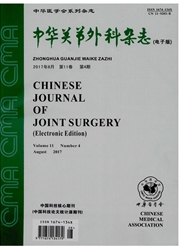

 中文摘要:
中文摘要:
目的探讨应用新型聚乙烯酰胺(PEI)包覆的超顺磁性氧化铁(SPIO)标记骨髓间充质干细胞(bMSCs)对其生物学特性的影响。方法分离、培养贵州小香猪bMSCs,选取第3代bMSCs,用含铁浓度为4、6、8、10、12μg/ml的DMEM/F12培养液孵育24h,未标记组为对照。通过普鲁士蓝染色、透射电镜检查、胎盼蓝染色、MTT检测及成骨、成软骨、成脂诱导分化实验,探讨不同PEI/SPIO浓度对bMSCs标记效率、细胞活性、增殖及分化的影响。结果铁浓度为8μg/ml以上的SPIO标记bMSCs后,普鲁士蓝染色标记效率均接近100%。与对照组相比,Fe浓度为4、6、8μg/ml的PEI/SPIO标记的bMSCs活细胞比率均在95%以上,差异无统计学意义(P〉0.05);而Fe浓度为10μg/ml时,活细胞比率约为(80.24±1.34)%,Fe浓度为12μg/ml时,活细胞比率约为(75.44±2.33)%,两者对细胞的活性有明显的抑制作用(P〈0.05)。4、6、8g/ml的PEI/SPIO标记的bMSCs成骨、成软骨及成脂分化与正常对照组相比无明显差异,而10、12ug/ml组在诱导培养过程中大部分细胞死亡。结论含铁浓度8μg/ml是PEI/SPIO标记干细胞的适宜浓度,既能高效地标记bMSCs,又不影响bMSCs的细胞活性及增殖分化能力等生物学特性。
 英文摘要:
英文摘要:
Objective To investigate the effects of superparamagnetic iron oxide covered by amphiphilic polyethylenimine (PEI)/SPIO biological characteristics of bone marrow derived mesenchymal stem cells (bMSCs) on their. Methods BMSCs were obtained and cultured from Guizhou minipig. The fourth passage of bMSCs were divided into five groups, and incubated in DMEM/F12 containing PEI/SPIO of 4, 6, 8, 10, 12 μg/ml respectively for 24 hours. Labeled cells were compared with unlabeled cells by Prussian blue staining, transmission electron microscope, Trypan blue staining, MTT test and inductions of osteogenesis, chondrogenesis and adipogenesis, to evaluate the effects of SPIO on cell labeling efficiency, cell viability, proliferation and differentiation ability. Results The labeling efficiency of SPIO (8, 10, 12 μg/ml, 24 h) was close to 100% according to Prussian blue staining. In 4, 6 and 8 μg/ml group, no statistically significant difference was found in cell viability or proliferation between labeled and unlabeled cells (P0.05). Osteogenic, chondrogenic and adipogenic inductions demonstrated that labeled bMSC had the ability to differentiate into osteoblasts, chondroblasts and adiptoblasts. In 10, 12 μg/ml group, there were statistically significant differences in the viability, proliferation between labeled and unlabeled cells (P0.05), and most of cells deceased in the procedure of osteogenic, chondrogenic and adipogenic inductions. Conclusions PEI/SPIO of 8 μg/mL can effectively label porcine bMSCs, without influencing the cell viability, proliferation and the multiple differentiation ability.
 同期刊论文项目
同期刊论文项目
 同项目期刊论文
同项目期刊论文
 Bone Marrow-derived Mesenchymal Stem Cells versus Bone Marrow Nucleated Cells in the Treatment of Ch
Bone Marrow-derived Mesenchymal Stem Cells versus Bone Marrow Nucleated Cells in the Treatment of Ch 期刊信息
期刊信息
